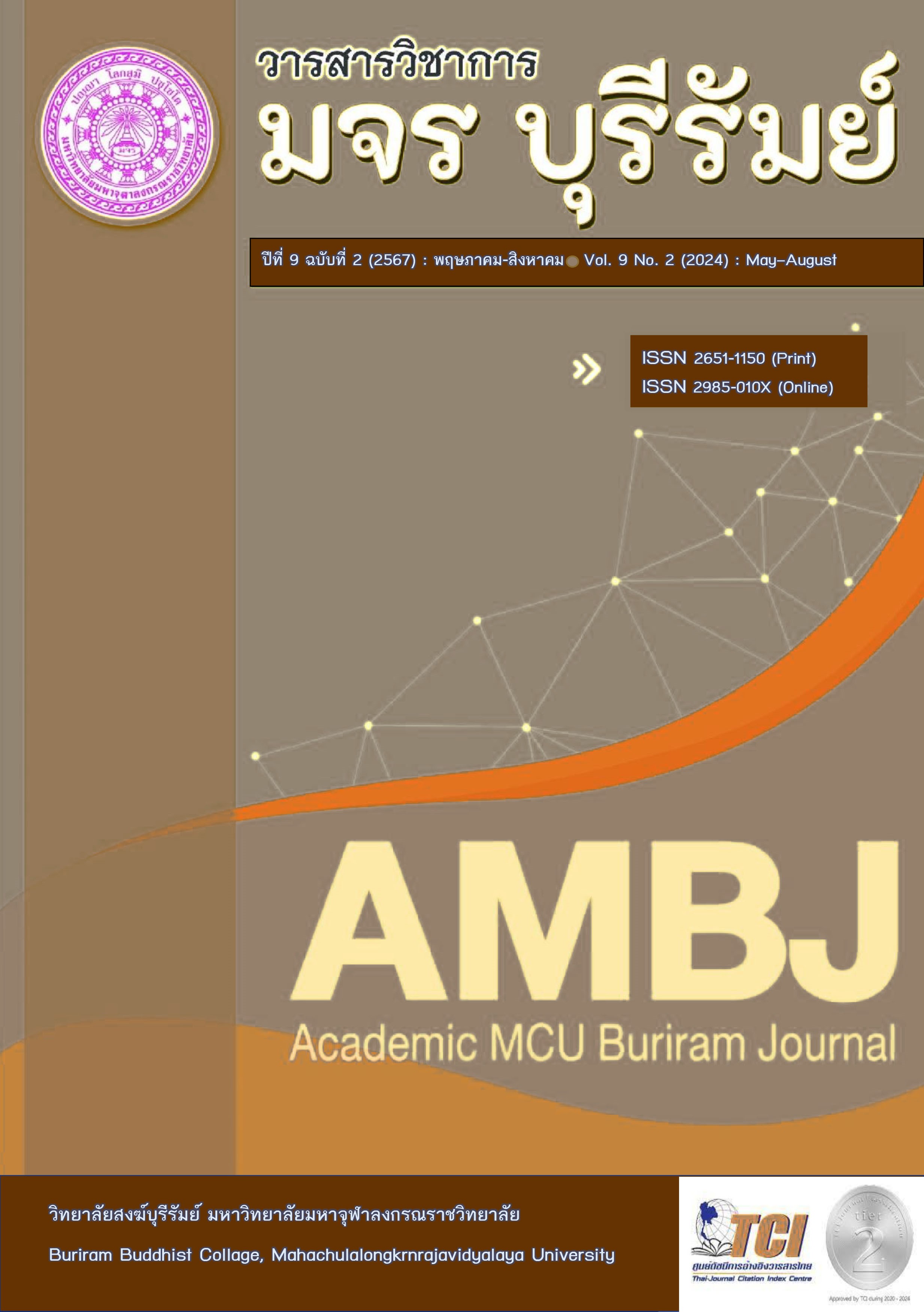The Effects of an Experiential Learning Management (ELT) to Develop Learning Achievement and Learning Retention on Health Balance of Mathayom 4
Keywords:
Learning Management from Direct Experiences, Learning Persistence, Academic AchievementAbstract
The purposes of this research were: 1) to compare the academic achievement of Mathayom 4 students before and after studying by using the Direct Experiential Learning (ELT) model on maintaining balance in the human body. 2) to study the academic achievement of Mathayom 4 students. After using the direct experiential learning (ELT) model on maintaining balance in the human body Compare the criteria of 70 percent. and 3) to study the learning ability of Mathayom 4 students after using the experiential learning (ELT) model on maintaining spectral balance. The sample was Mathayom 4 students of Ka School. Kanchanaphisek College Nakhon Pathom (Phratamnak Suankularb Mathayom) Semester 2, academic year 2023, using the cluster sampling method. The tools used to collect data include the learning achievement test on Maintaining balance in the human body Data were analyzed using the index of concordance (IOC), difficulty (p) and discriminatory power (r), and confidence using the KR-20 formula. Hypotheses were tested using T values (t-test).
The research results found that:
1. Students who have used direct experiential learning (ELT) on maintaining balance in the human body. There was a significant difference between the mean scores from the pre-experiment and post-experimental achievement tests at the 0.05 level.
2. Students who have used direct experiential learning (ELT) on maintaining balance in the human body. Have an average score from taking the academic achievement test after studying. Higher than the 70 percent threshold.
3. Students who have used direct experiential learning (ELT) on maintaining balance in the human body. Have durability in learning There is no statistical significant difference at the .01 level.
References
กันต์กนิษฐ์ พลพิพัฒน์. (2560). การศึกษาผลสัมฤทธิ์ทางการเรียนและทักษะการแก้โจทย์ปัญหาคณิตศาสตร์ของนักเรียนโดยใช้กลวิธี STAR. วิทยานิพนธ์ครุศาสตรมหาบัณฑิต สาขาวิชาหลักสูตรและการสอน. บัณฑิตวิทยาลัย: มหาวิทยาลัยราชภัฏรำไพพรรณี.
ชลธิชา เก็นซ์. (2560). การศึกษาผลสัมฤทธิ์ทางการเรียนรู้และความคงทนในการเรียนรู้วิชาวิทยาศาสตร์ของนักเรียนชั้นมัธยมศึกษาปีที่ 5/2 โรงเรียนสาธิตมหาวิทยาลัยราชภัฏสวนสุนันทา โดยใช้วิธีการเรียนแบบสรุปเนื้อหา. รายงานการวิจัย. มหาวิทยาลัยราชภัฏสวนสุนันทา.
เรียมพร แสนซุ้ง. (2558). การจัดกิจกรรมการเรียนรู้ตามแนวคิดการจัดการเรียนรู้เชิงประสบการณ์ เพื่อส่งเสริมผลสัมฤทธิ์ทางการเรียนและความสามารถในการแก้ปัญหาทางคณิตศาสตร์ เรื่อง อัตราส่วนและร้อยละ สำหรับนักเรียนชั้นมัธยมศึกษาปีที่ 2. วิทยานิพนธ์การศึกษามหาบัณฑิต สาขาวิชาวิทยาศาสตร์ศึกษา. บัณฑิตวิทยาลัย: มหาวิทยาลัยนเรศวร.
สิริวัฒน์ พงศ์แพทย์พินิจ. (2562). หนังสือเรียนรายวิชาพื้นฐานวิทยาศาสตร์ เทคโนโลยี (การออกแบบและเทคโนโลยี) ชั้นมัธยมศึกษาปีที่ 5. กรุงเทพมหานคร: แม็คเอ็ดดูเคชั่น.
สำนักงานคณะกรรมการการศึกษาขั้นพื้นฐาน. (2560). ตัวชี้วัดและสาระการเรียนรู้แกนกลาง กลุ่มสาระการเรียนรู้วิทยาศาสตร์ (ฉบับปรับปรุง พ.ศ. 2560) ตามหลักสูตรแกนกลางการศึกษาขั้นพื้นฐาน พุทธศักราช 2551. พิมพ์ครั้งที่ 1. กรุงเทพมหานคร: กระทรวงศึกษาธิการ.
ศุภศักดิ์ อ่อนสันต์. (2566). การพัฒนากระบวนการจัดกิจกรรมแนะแนวตามแนวคิดกระบวนการคิดเชิงออกแบบร่วมกับการจัดการเรียนรู้ด้วยกรณีศึกษาเพื่อส่งเสริมความสามารถในการแก้ปัญหาอย่างสร้างสรรค์สำหรับนักเรียนชั้นมัธยมศึกษาปีที่ 4. วารสารการวิจัยการศึกษาขั้นพื้นฐาน, 3(2), 1-19.
อารีย์ ศรีสุกอง. (2562). ผลการจัดการเรียนรู้แบบประสบการณ์ ที่มีต่อผลสัมฤทธิ์ทางการเรียน เรื่องความน่าจะเป็น สำหรับนักเรียนชั้นมัธยมศึกษาปีที่ 3. การค้นคว้าอิสระ การศึกษามหาบัณฑิต สาขาวิชาหลักสูตรและการสอน. มหาวิทยาลัยนเรศวร.
Christy Visaggi and Jeffrey Young. (2020). Experiential Learning Theory. Senior Faculty Associates for Signature Experiences. Retrieved from https:// myexperience.gsu.edu/faculty/resources/theory/ (Accessed April 18, 2024).
Downloads
Published
How to Cite
Issue
Section
License
Copyright (c) 2024 Academic MCU Buriram Journal

This work is licensed under a Creative Commons Attribution-NonCommercial-NoDerivatives 4.0 International License.
ทัศนะและความคิดเห็นที่ปรากฏในบทความวารสารฉบับนี้ถือเป็นความรับผิดชอบของผู้เขียนบทความนั้น ไม่ถือเป็นทัศนะและความรับผิดชอบของบรรณาธิการ





